Welcome to the ultimate showdown between two titans of AI: Generative AI vs Predictive AI. Imagine a world where machines can predict the future and create entirely new worlds of art, music, and literature. On one side, there’s Generative AI, the imaginative artist of the AI world. On the other hand, there’s Predictive AI, the smart analyst who can guess what’s coming next.
Both these AI tools offer something. But which one would be your favorite? Who will win?
Get ready for the ultimate AI showdown!
Generative AI – Quick Intro!
Think of Generative AI as the creative one. It’s like an AI artist that learns from existing stuff to make new things. For example, it can learn from pictures, words, or even music to create something new. This type of AI doesn’t just copy stuff—it uses what it learns to make something unique and cool.
 It’s not just about pictures and words; it can also make sounds and help out when there’s not enough data to work with. It’s like a helpful friend for boosting creativity and coming up with new ideas.
It’s not just about pictures and words; it can also make sounds and help out when there’s not enough data to work with. It’s like a helpful friend for boosting creativity and coming up with new ideas.
Pro Tip: Want to explore other options regarding AI Image generators? That’s what we have!
Pros/Cons
| Pros |
Cons |
| Data Boost |
Copies same ideas sometimes |
| Creative writing and art |
Vulnerability to tricks |
| Content Creation |
Content Confusion |
| Makes Music |
Privacy Risks |
| Used in Different Fields |
Plagiarism Issues |
| Data Analysis |
Ethical concerns |
Use Cases Of Generative AI
 Generative AI helps people like writers, artists, and musicians by making new things but doesn’t replace their work. It’s super handy in businesses, where it can write stuff like letters, create images from text, make short videos, and even compose music.
Generative AI helps people like writers, artists, and musicians by making new things but doesn’t replace their work. It’s super handy in businesses, where it can write stuff like letters, create images from text, make short videos, and even compose music.
Examples of Generative AI Applications
Generative AI is used for several purposes and in several applications. Let’s see some of those.
| Generative AI in Healthcare |
Generative AI in Education |
Generative AI in Media and Entertainment |
Generative AI in Manufacturing |
Generative AI in Construction and Real Estate |
| Symptom assessment apps like ‘Ada’ |
Video creation tools like ‘Synthesia’ |
Interactive AI chatbots like My AI on ‘Snapchat’ |
Copywriting assistants like Hyperwrite |
AI chatbots like ChatGPT |
| Early detection apps like ‘SkinVision’ |
Assessment platforms like ‘Gradescope’ |
Character Creation like ‘ChatFAI’ |
Decision support tools like Wizdom.ai |
AI design tools like Maket.ai |
| Accessibility tools like ‘Be My Eyes.’ |
Research summarization tools like ‘Genei.’ |
Writing assistants like ‘Sudowrite.’ |
3D simulation apps like Protostar.ai. |
Communication and marketing platforms like SocialBu |
Predictive AI – Quick Intro!
Imagine predictive AI as the fortune teller of the digital world. Instead of crystal balls and tarot cards, it uses data and fancy math to predict what’s coming next. So, while generative AI is busy creating new stuff, like art or music, predictive AI is more like your Crystal ball companion, looking into the past to tell you what’s likely to happen in the future.
It’s like having a super-smart buddy who can tell you, “Hey, I think this is going to happen next!” And that’s not all.
 Predictive AI can help businesses make smart decisions by spotting data patterns and predicting what customers might do next. So, Predictive AI is here to help us all see into the crystal ball of data and make some fancy choices.
Predictive AI can help businesses make smart decisions by spotting data patterns and predicting what customers might do next. So, Predictive AI is here to help us all see into the crystal ball of data and make some fancy choices.
Insider Hack: Do you want to know more about the role of AI in Entertainment Industry? That’s what we think about this.
Pros/ Cons
| Pros |
Cons |
| Saves time |
Uncertain outcomes |
| Predict trends |
Needs good data |
| More accurate |
Hard to Understand |
| Personalization |
Resource-heavy |
| Foresees the Future |
Ethical worries |
Use Cases Of Predictive AI
 Predictive AI helps banks and businesses make smart decisions by guessing what will happen next. It’s like having a crystal ball for finance, retail, manufacturing, healthcare, and marketing. Predictive AI can also be used for many other purposes.
Predictive AI helps banks and businesses make smart decisions by guessing what will happen next. It’s like having a crystal ball for finance, retail, manufacturing, healthcare, and marketing. Predictive AI can also be used for many other purposes.
Examples of Predictive AI Applications
| Sector |
Predictive AI Examples |
| Insurance |
Understanding customer risk to set fair prices and detect fraudulent claims. |
| Healthcare |
Predicting when patients come, stopping sickness spreads, and customizing treatments. |
| Finances |
Predicting loan defaults, detecting fraud, and making smart investment choices. |
| Sports |
Watching how players do, guessing their worth, and making teams better. |
| Weather |
Saying what the weather will be, guessing bad storms, and helping get ready for disasters. |
Face Off – Generative AI vs Predictive AI
| Aspect |
Generative AI |
Predictive AI |
| Functionality |
Creativity: Generates new content based on existing data |
Prediction: Forecasts future outcomes based on past data |
| Pros |
Enhances creativity
Content creation across various domains
Used in different fields |
Time-saving
Predicts trends
Foresee the Future |
| Cons |
May replicate existing ideas
Privacy risks
Content confusion
Ethical worries |
Uncertain outcomes
Resource-heavy
Hard to understand
Ethical worries |
| Data |
Requires diverse data for creativity |
Relies on high-quality historical data for accuracy |
| Applications |
Healthcare
Media and Entertaiment
Manufacturing
Education |
Insurance
Healthcare
Finance
Sports
Weather |
| Examples of Tools |
Synthesia (video creation)
ChatGPT (AI chatbot)
SocialBu (communication and marketing platform)
ChatFAI (Character Generator) |
Fraud detection systems in banks
Healthcare diagnosis tools
Weather forecasting models |
In this showdown, deciding which AI is better, Generative AI vs Predictive AI depends on what you want to do with it.
Generative AI is great if you want to create new art, music, or stories.
On the other hand, if you need help figuring out what might happen in the future, then Predictive AI is your go-to.
So, it really depends on what you need help with – being creative or predicting the future!

Insider Hack: Want to generate a character and don’t know how to do that? Well, you are in luck; our ChatFAI overview has got you covered.
Let’s explore some other types of AI with a quick introduction. Let’s dive in!
Generative AI vs Discriminative AI
Generative AI tries to understand how different things in a dataset relate. It’s like detectives trying to figure out how things can happen together. But it can be slow and get confused by unusual stuff in the data.
 Discriminative models, on the other hand, focus on just telling things apart. They’re like classifiers, quickly deciding which group something belongs to. They’re better at handling unusual data and work faster, making them great for tasks where we already know the answers.
Discriminative models, on the other hand, focus on just telling things apart. They’re like classifiers, quickly deciding which group something belongs to. They’re better at handling unusual data and work faster, making them great for tasks where we already know the answers.
Generative AI vs Predictive AI vs Machine Learning
| Comparison |
Generative AI |
Predictive AI |
Machine Learning |
| Function |
Creates new content like art or music |
Forecasts future events based on past data |
Teaches computers to learn from data, including both generative and predictive AI |
| Examples |
Generating art, music |
Forecasting sales trends |
Learning from data to perform various tasks |
Generative AI vs Predictive AI vs Conversational AI
| Comparison |
Generative AI |
Predictive AI |
Conversational AI |
| Function |
Creates new content like art or music |
Forecasts future outcomes based on historical data |
Creates AI systems for natural language interactions like chatbots |
| Examples |
Generating art, music |
Forecasting future events |
creating chatbots, virtual assistants |
Generative AI vs Predictive AI vs Artificial Intelligence (AI)
| Comparison |
Generative AI |
Predictive AI |
Artificial Intelligence |
| Function |
Creates new content |
Forecasts future outcomes |
Encompasses various forms of artificial intelligence |
| Examples |
Generating art, music |
Forecasting sales trends |
Includes generative and predictive AI, robotics, expert systems |
Generative AI vs Machine Learning vs Traditional AI
| Comparison |
Generative AI |
Machine Learning |
Traditional AI |
| Function |
Creates new content |
Teaches computers to learn from data |
Performs tasks based on predefined rules or algorithms |
| Examples |
Generating art, music |
Learning from data to perform various tasks |
Alexa, Siri
Recommendation engines on Netflix or Amazon |
Pro Tip: If you want to learn more about AI chatbots and how they work. Our Guide to AI Chatbots will help you understand them in detail.
The Verdict: Who Emerges Victorious?
Both bring cool stuff to the table in the big battle between Generative AI vs Predictive AI. Generative AI is like a creative artist making new things like art or music. Predictive AI is more like a wise fortune-teller, guessing what might happen next based on what’s happened before.
So, who wins?
Well, it depends on what you need. They’re both valuable depending on what you need: creativity or foresight. Combining them can lead to even better results in the world of AI.
Have you tried any of them?
What are your thoughts?

Let us know in the comments section!
FAQs
Q: What is the difference between Predictive AI and Generative AI?
Predictive AI tries to guess what will happen next based on existing data. It’s like predicting the weather based on past patterns.
Generative AI creates new things, like generating music or images, often using patterns from existing data but making something fresh.
Q: What is the difference between Generative AI and AI?
Generative AI creates new things like images, music, or text. While AI, in general, can do many tasks, including generating new content.
Q: What is the difference between Specialized AI and Generative AI?
Specialized AI is really good at doing one specific task well, like recognizing faces or playing chess.
Generative AI, on the other hand, creates new things, like images or music.
Q: Can generative AI make predictions?
No, Generative AI mainly creates new stuff, like pictures or music. It doesn’t predict the future. Predictive AI guesses what might happen next based on past data.